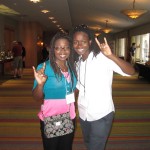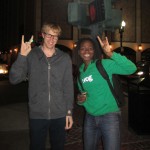A Perspective of Three: The 2012 North American Society for the Sociology of Sport, Conference New Orleans, LA
The University of Texas at Austin’s sociology department had a strong presence at the annual North American Society for the Sociology of Sport conference this year in New Orleans, LA. Dr. Ben Carrington and graduate students Letisha Brown, Lady Adjepong, and Nick Szczech all presented their sociological research projects centering on different aspects of race, ethnicity, and gender in the context of sport. The conference provided Letisha, Lady, and Nick with opportunities to receive feedback from scholars, network, and gain experience organizing a scholarly presentation. Each graduate student reflected on what they found most valuable about the NASSS experience.
This year’s North American Society for the Sociology of Sport Conference (NASSS), was my second foray into the world of sports sociology, and my first trip to New Orleans, Louisiana. For me, this conference was more about networking and getting my name out into the world of sports sociology. On day two of the conference I was nominated and elected to the position of Graduate Representative on the NASSS Board, a two year position that will enable me to engage closely with faculty from across the globe; as well as the graduate students who have entrusted me to serve as their voice. This nomination was a happy surprise, and an opportunity to build my experience within this organization.
In addition to this honor, I was also privileged enough to have lunch with Michael Messner, a guru of gender and sport sociology and author of several publications including: Out of Play: Critical Essays on Gender & Sport, Sex, Violence, Power in Sports: Rethinking Masculinity, and Power at Play: Sports and the Problem of Masculinity. During the lunch I received sage advice, support and encouragement for my work as a young scholar and my participation on the board of a respected organization. Attending conferences and making connections is one of the most rewarding parts of the graduate experience. Having the opportunity to do it in a city as eclectic as New Orleans, with other people from the department to share the experience with (Lady, Nick and Ben), is a plus!
Utilizing a Community of Scholars as Preparation for NASSS
As a first-year graduate student in the UT sociology department and with NASSS being my first academic conference, I had no idea what to expect. Thankfully, the sociology department and my fellow graduate students provided invaluable insights and support throughout the entire process. In early August, Letisha Brown, my graduate student mentor and fellow NASSS conference attendee, originally alerted me about submitting an abstract before the start of my first semester at UT. In my opinion, the department’s graduate student mentor program is one of the department’s strengths because these student mentors provide the “first years” with insights, perspectives, and advice on a multitude of topics—from how to prepare for classes to tips for publishing to networking advice—since they have already “walked in our shoes,” so to speak.
After having our abstracts accepted, we scheduled an informal “brown bag” for Letisha, Lady, and myself to present our research a few weeks before the conference. In front of a group of staff and fellow graduate students, we received feedback about our presentations’ theoretical content, our presentation styles, and tips for improving the visual layout and organization of our power points, among other critiques. This audience was comprised of a mix of qualitative and quantitative graduate students with all of them having a variety of subfield specialties from gender to social movements. The diversity of subfields also provided us, as scholars, with unique insights and created a discussion that forced us, as presenters, to critically analyze how we presented our research to scholars who might not understand our theoretical frameworks or sociological subfields.
For me, this “brown bag” was an important experience, since it forced me to think critically about my presentation style and organization while also acquiring an outside perspective on and critique of the research project I had been revising for over a year. Letisha, Lady, and myself all utilized the critiques to improve our presentations, so that we arrived in New Orleans confident in the strength of our presentations—knowing we had already clarified any issues with our peers.
Spending a three-day weekend with scholars of sports was an amazing experience. NASSS in New Orleans was the second time I presented my research on women’s rugby to an audience of sociologists of sports and it yielded a very rewarding dialogue.
I arrived in New Orleans on Thursday, after Nick and Letisha had already spent the day getting to know the graduate students and socializing with the other scholars. When I got to the conference site, I was pleased to find several rooms overflowing because so many people were interested to hear the material being presented. The first presentation I sat in on was so packed that several of us sat on the floor. The discussion centered on U.S. media coverage of women in the Olympics, Nigerian women’s access to sports, and perceptions of violence in women’s tennis. Following the presentations, the conversation was lively as most people in the room had critical perspectives on gender, race, and ethnicity in sports.
Nick and I were presenting in the same session on “Multiple Femininities/ Multiple Masculinities.” Unfortunately, Letisha was presenting at the same time as Nick and so we were unable to hear her. But as Nick mentioned, we had the chance to hear each other’s presentation and provide feedback, which truly was invaluable.
After attending ISSA and NASSS conferences, I have come away convinced of the value of specialization conferences. In the summer of 2012 I presented at ISSA in Glasgow (thanks to Dr. Christine Williams and Dr. Sheldan Ekland-Olson for their support in funding my trip!). Like NASSS, ISSA was an opportunity for me to meet scholars of sports from different disciplines and across geographic locations. There I made connections with other scholars who study women’s rugby and remain in touch with them. For me, these specialization conferences allowed me to learn what other kinds of work are happening in the field of sports studies, and at the intersections of gender, race, and sexuality. These conferences also highlight the need to speak across disciplines and within our discipline of sociology.
Overall lessons from NASSS:
1. Present to your peers! As Nick said, the brown bag was a fine way to get feedback about our presentations and allowed us to stand in front of other scholars and share our work.
2. Network at conferences: Letisha highlights the importance of meeting scholars and participating in different groups within conference organization.
3. Seek out specialization conferences: Lady shows us how these conferences allow us to think broadly about the work that we do.



